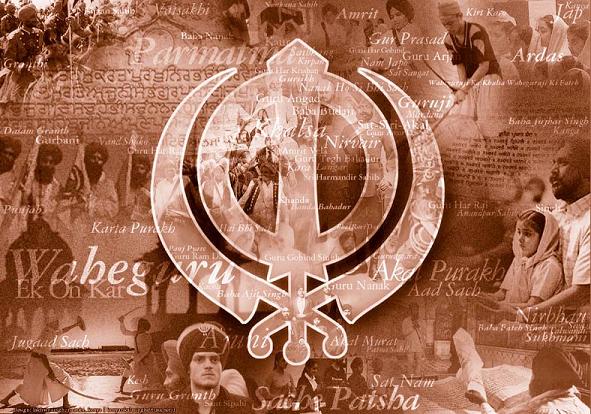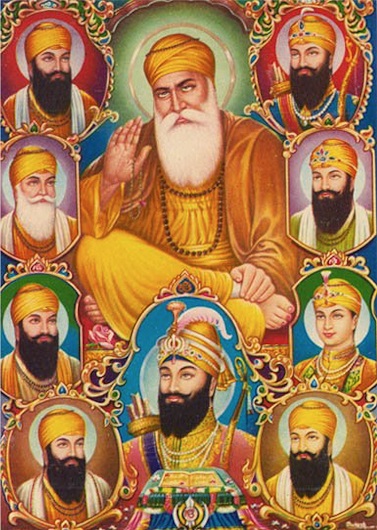The utterance of Sat Sri Akal is undoubtedly the most commonly used greeting throughout the Sikh Community. What is the literal meaning of Sat Sri Akal? What does this phrase really imply? What message does it convey? Is it Namskara or a Jaikara? Is it right to label the phrase of Jaikara; a war cry? These are some of the questions, which are addressed below.
Before discussing the above questions, it is important to remember that the most common greeting used by Guru Nanak was Sat Kartar, and throughout the period of the Sikh Gurus this remained a popular greeting among the Sikhs. However, it was with the advent of the Khalsa and the use of Waheguru ji ka Khalsa, Waheguru ji ki Fateh as a new greeting by the Amritdhari Sikhs (Khalsa) and the subsequent popularity of Sat Sri Akal as a Jaikara, that the use of Sat Kartar became almost obsolete among the Sikhs. But, it is also important to know that both the phrases Sat Kartar and Sat Sri Akal mean exactly the same, as 'Sri Akal' is another name for 'Kartar', God, the Creator
Further more, it should be noted that the word 'greeting' might be taken in its broader sense, covering both the Panjabi terms of Namskar or Namskara,and Jaikar or Jaikara as often used in the holy Guru Granth. Therefore, before giving an essential explanation of the Sikh greeting Sat Sri Akal as a Namskara or a Jaikara, the meanings of both these terms need to be fully understood.
Namaskar is a compound word made up from 'Namas' and 'Kar'. Namas means to bend or bow to show humility and Kar means an act of doing something, or an action. Therefore, Namaskar (Namskara) is an act of humility, or a gesture of goodwill, which may or may not contain an utterance, a word or a phrase.
Jaikar is also a compound word; 'Jai' meaning success or victory and 'Kar' (an action) as explained above. Therefore, Jaikara is an act or an utterance, expressing a symbolic show of strength and achievement.
Now, let us start with analysing the phrase Sat Sri Akal and be absolutely clear about the literal as well as the implied meaning behind this greeting. It can be divided into two parts; namely 'SAT' and 'SRI AKAL'. Both the words 'Sat' and 'Akal' appear in the opening sentence of the Holy Guru Granth. This sentence is popularly known as the Mool Mantar (the Basic Belief).
First take the word SAT. Literally, Sat means truth. However, Guru Nanak has made it very clear in the Mool Mantar that by 'truth' he means One and only One, the God, who is the Creator, who is beyond birth and death and who is Self Existent. He then starts the next sentence:
ਆਦਿ ਸਚੁ ਜੁਗਾਦਿ ਸਚੁ ਹੈ ਭੀ ਸਚੁ ਨਾਨਕ ਹੋਸੀ ਭੀ ਸਚੁ ॥
(SGGS-1)
Therefore, the Sikhs are advised to remember and recite God's name - the Truth; Who was there, ever in the beginning and throughout the ages, prevailing now and forever. This concept of 'God as the Truth' is repeated throughout the holy Guru Granth emphasising that God pervades everywhere like ether.
ਆਪਿ ਸਤਿ ਕੀਆ ਸਭ ਸਤਿ ॥ or ਮੂਲ ਸਤਿ ਸਤਿ ਉਤਪਤਿ ॥
(SGGS - 294)
Therefore, blessed are those who follow the True One:
ਜੋ ਸਤਿਗੁਰ ਕੀ ਸਰਣਾਗਤੀ ਹਉ ਤਿਨ ਕੈ ਬਲਿ ਜਾਉ ॥
ਦਰਿ ਸਚੈ ਸਚੀ ਵਡਿਆਈ ਸਹਿਜੇ ਸਚਿ ਸਮਾਉ ॥
(SGGS - 31)
Although this word 'Sat' has been derived from the Sanskrit word 'Satya', a more popular Panjabi form of the same word is 'Sach'. As the Gurus were keen to communicate in the language of the common people, they preferred to use this word Sach more often with a variety of inflexions, e.g. ਸਚੁ, ਸਾਚਿ, ਸਚਾ, ਸਚੈ, ਸਚੜਾ ਆਦਿ ।
Indeed this word (concept) 'Sat' or 'Sach' has been used in more than twenty forms in the holy Guru Granth Sahib Ji. A thorough study of the Holy Granth reveals that except from the word hir no other word has been repeated so often; appearing almost on every page, and occasionally more than twenty times on the same page. Undoubtedly, the word 'Truth' is the most important and indispensable concept in the Sikh Faith.
Now take the two words SRI and AKAL. The word Akal literally means timeless, not bound by past, present or future. However, by prefixing another word Sri (a title) from the holy Granth, it becomes a proper noun - SRI AKAL, The Timeless One, the WAHEGURU, the God. The whole of this phrase Sat Sri Akal can best be translated as, TRUTH IS GOD or GOD IS TRUTH. Therefore, to emphasise these meanings, the Guru has asked every Sikh to remember that God and Truth is one and the same thing ---
ਸਸਾ ਸਤਿ ਸਤਿ ਸਤਿ ਸੋਊ ॥ ਸਤਿ ਪੁਰਖ ਤੇ ਭਿੰਨ ਨਾ ਕੋਊ ॥
(SGGS - 250)
After establishing the correct meaning of 'Sat Sri Akal' we can address ourselves to the question of how both the terms Namskara and Jakara are valid for this utterance. In doing so we must understand the situation and circumstances, which prompt a person to act or react by using the phrase Sat Sri Akal either as a 'polite heartfelt greeting' or as a 'propelling enthusiastic slogan'.
Scenario A - Sat Sri Akal as a Namaskara:(polite heartfelt greeting)
When we meet or depart a friend or a relative or even a stranger and we wish to show our goodwill, love or respect it is very apt to use the sweet sounding words of Sat Sri Akal. This is Sikh Namaskar. It helps to remind ourselves and the other person of the existence of the True Lord who is the Creator and Custodian of the whole universe and in whose name we dedicate this act.
ਨਉ ਖੰਡ ਪ੍ਰਥਮੀ ਇਸੁ ਤਨ ਮਹਿ ਰਵਿਆ ਨਿਮਖ ਨਿਮਖ ਨਮਸਕਾਰਾ ॥
(SGGS - 208)
This humble act of Namaskar, the noble thought of greeting with the words of Sat Sri Akal, the message of keeping God's name in mind surely pleases the Guru.
ਸਦ ਬਲਿਹਾਰੇ ਕਰਿ ਨਮਸਕਾਰੇ ਜਿਨ ਭੇਟਤ ਪ੍ਰਭ ਜਾਤਾ ॥
(SGGS - 453)
In simple words the utterance of 'Sat Sri Akal' is like saying to the other person- hey fellow! ( friend, brother, sister, son etc.) 'Remember God, Remember Truth.'
The Namaskar of Sat Sri Akal is not only dedicated to the memory of God the Truth, but also directs us towards good actions and to follow nothing but the Truth which saves us from all evils.
ਸਦ ਬਲਿਹਾਰੇ ਕਰਿ ਨਮਸਕਾਰੇ ਜਿਨ ਭੇਟਤ ਪ੍ਰਭ ਜਾਤਾ ॥
(SGGS - 468)
Thus by exchanging and sharing Sat Sri Akal with its inherent appeal we are also adding to the followers of the Truth ( ਸਚੁ ਮਿਲੈ ਸਚੁ ਉਪਜੈ ) as well as helping ourselves towards a goal which is much higher and more noble than just a customary greeting.
ਸਤਿ ਸਰੂਪ ਰਿਦੈ ਜਿਨ ਮਾਨਿਆ ॥ ਕਰਨ ਕਰਾਵਨ ਤਿਨ ਮੂਲ ਪਛਾਨਿਆ ॥
(SGGS - 285)
Scenario B- Sat Sri Akal as a Jaikara: (propelling enthusiastic slogan)
As already stated a Jaikara is an announcement or a loud declaration invoking or rejoicing success in an action. Therefore, when Sikhs wish to pursue a common cause, or acknowledge its success, then their vibrant concordant voice, seeking or celebrating victory, is most appropriately contained in the sounding of a Jaikara, and in the words of Sat Sri Akal. But here, this action is preceded by a loud and leading call of boley so nihal (who ever responds will be blessed), inviting everyone around to say Sat Sri Akal. Thus by helping ourselves to remember God, the Supreme Truth, we can be sure of keeping ourselves on course in our action. Because the action we have taken or are about to take is all in the name of the True One, the Waheguru. Therefore, the key to its success is in the strength of our belief in the concept of Sat Sri Akal.
It is most regrettable to note that some Sikh academics and religious leaders have not been able to fully appreciate the universality of the concept of Sat Sri Akal, especially as a greeting. They are perhaps influenced by the earlier traditions of the 'Nihang Singhs' who were generally simple minded but earnestly dedicated to their religious rituals. This has led to a false belief that Sat Sri Akal is associated with the Jaikara only, thereby undermining and diminishing the role and realm of this remarkable and a wholly divine concept. Because of this apparently innocent mistake, the honoured place of this sublime and solemn Sikh Salutation was lost to a limited meaning as a slogan or a Jaikara only.
During the Anglo-Sikh wars the Sikh regiments were engaged in battles against the British, and later during the First and Second World Wars the Sikhs joined the British armies as a friendly side. During all these battles and enemy encounters the British military personnel were very impressed by the Sikh courage and bravery arising from the Spirit of Sat Sri Akal with the sounding of a jaikara. However, and perhaps unwittingly, the British gave a new but rather derogatory meaning to the Sikh Jaikara of Sat Sri Akal. It was called a 'War Cry'. The sad thing is that the Sikh community as a whole seem to have accepted this interpretation of the British as a compliment. Not only does this term 'War Cry' smack of less civilised behaviour, usually attributed to a jungle tribe, it is also a humiliating interpretation of the Sikh Jaikara. This diversionary meaning seems to disfranchise Sikhs of their pledge or priority to Righteous Acts- ਸ਼ੁਭ ਕਰਮਨ ਤੇ ਕਬਹੂ ਨ ਟਰੋ, for which they would not shirk fighting to the finish, and indeed to Victory- ਨਿਸਚੈ ਕਰ ਆਪਣੀ ਜੀਤ ਕਰੋ ।
There is no doubt that the Sikhs are reputed for their courage and gallantry in the battlefield, but it is no honour to the community if this bravery is attributed to some form of violence or 'War Cry'. Courage and bravery are indeed initiated by the spirit of service and sacrifice among Sikhs.
It is to be noted that the booklet 'Sikh Rehat Maryada' mentions that a Sikh should utter Waheguru Ji Ka Khalsa Waheguru Ji Ki Fateh when meeting or greeting other Sikh/s. But this directive applies primarily to a Sikh as defined in its chapter on 'Gurmat Di Rehni'. Therefore, it is more appropriate to greet and welcome a a non-Sikh with the noble utterance of Sat Sri Akal,which qualifies to be a greeting of a universal religion by reciting and sharing the sublime thought that God is the Truth and the Truth alone, to be remembered in all our actions.
© Copyright Gurinder Singh Sacha
Please acknowledge quotations from this article
Articles may be published subject to prior approval by the author

